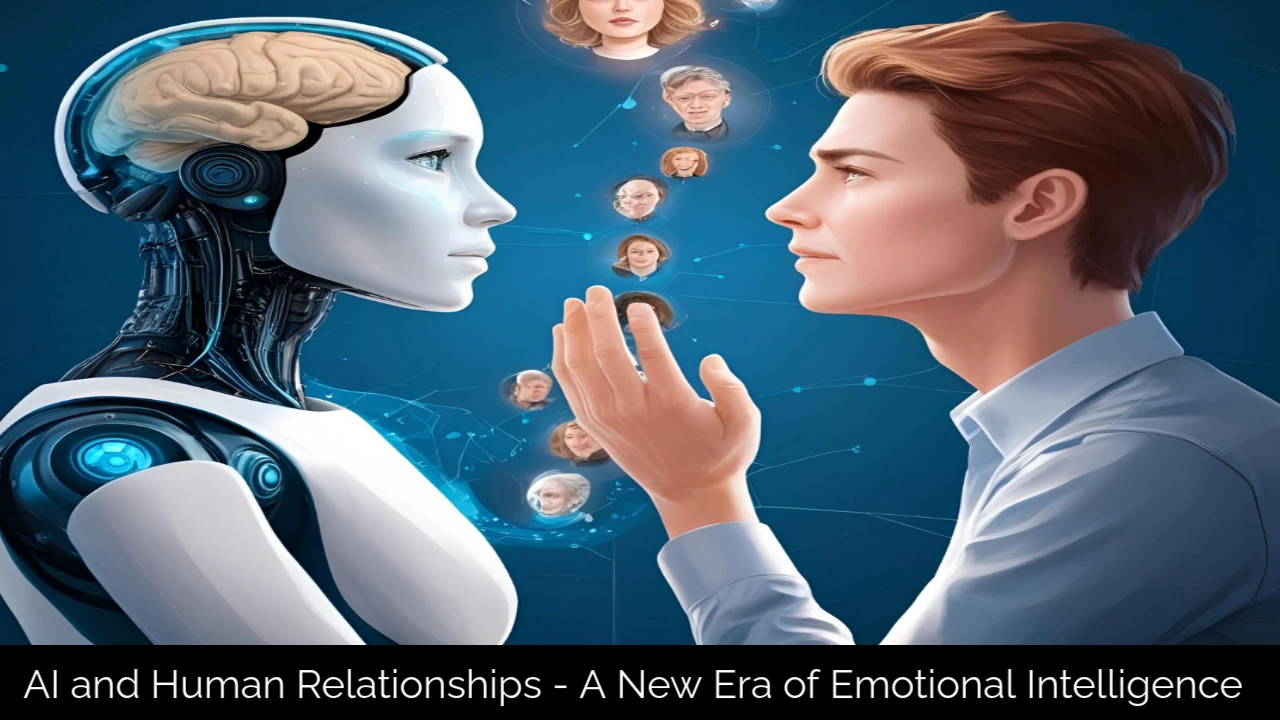In 2025, AI and Human Relationships is beginning to influence how people interact with Artificial Intelligence and perceive emotions, which could lead to the development of a new era of emotional intelligence. Furthermore, Artificial Intelligence has improved significantly in 2025 and can now recognize and respond appropriately to human emotions much more effectively.
Chat-bots, virtual assistants, and social robots are examples of new AI technologies designed to engage users in discussion and provide emotional and mental support.

The Psychology Behind AI and Human Connection – Can Machines Feel?
As we look ahead to 2025, Artificial Intelligence systems have been trained to detect and respond to human psychology and emotions, but there’s still a lot of discussion about whether they can genuinely understand the psychological experience of those emotions. Some experts say that Artificial Intelligence can only replicate human feelings and will never fully comprehend what individuals are experiencing at any moment.
It’s essential to remember that AI is still in the early phases of learning about human psychology, and it hasn’t yet achieved the ability to understand emotions in the same way that we do. For example, an AI may spot unhappiness in a human’s as per there text and voice and respond with comforting words, but it does not truly understand or feel empathy for humans.
Real vs Artificial: Navigating Love and Friendship with AI
When it comes to love and friendship in the age of Artificial Intelligence, things can get pretty complicated. We must carefully weigh the advantages and disadvantages of Artificial Intelligence because we are dealing with a combination of the real and the artificial. It is important to understand that while artificial intelligence can provide emotional support and companionship, it lacks empathy and the capacity to form genuine emotional bonds like humans do.
How AI Is Shaping Family, Friendship, and Romantic Relationships
Artificial Intelligence is speedily shifting human relationships, offering friendship and emotional support while raising questions about the future of intimacy and social connection. It’s also evolving beyond simple assistance to encompass roles like boy/girl friends, male/female partners, and even family members like mother, father, brother, and sister, etc., potentially influencing how humans interact and form bonds.
The Rise of AI Companions – Are We Replacing Real Human Bonds?
The Growing Popularity of AI Companions has an impact on providing solace and helping to lessen feelings of isolation, but they won’t ever take the place of the richness of human relationships. AI doesn’t have the emotional depth, understanding, and intricate social interactions that make our bonds with others so important. However, AI can serve as a useful tool to handle loneliness or to practice social abilities for those who are dealing with seclusion.
The Pros and Cons of AI in Human Emotional Connections
Pros of AI in Human Emotional Connections
Provides companionship and emotional support only.
Helps people who are in social anxiety or loneliness.
Can offer unbiased listening and responses.
Available 24/7 for interaction.
Cons of AI in Human Emotional Connections
Reduce real human interaction.
Lacks genuine empathy and consciousness.
Create dependency or emotional confusion.
Privacy and data security concerns.
Also Read: Digital Scams – How Technology Is Changing Fraud
FAQ – AI and Human Relationships
Can AI understand human emotions?
AI has the ability to recognize human emotions, but it can’t experience or grasp them in the same way people do.
Can people develop relationships with AI?
AI can mimic friendship, but it doesn’t have the ability to actually empathize, or develop real connections.
How does AI provide emotional support?
AI provides support without judgement, mitigates loneliness, and is always available.
Are there dangers in developing an emotional attachment to AI?
Yes, it might cause emotional uncertainty or reliance and reduce meaningful interactions between humans.
Will AI replace human relationships?
No, AI can be helpful, but it can’t serve as a substitute for real human connections.
Conclusion
AI is changing our emotional connections in many ways by providing companionship and support, but it cannot replace authentic human connection nor does it possess authentic empathy. The challenge is to prioritize authentic human connections while also using AI as a tool.



